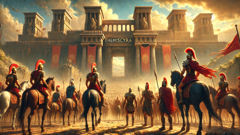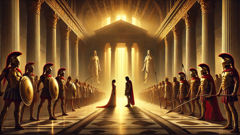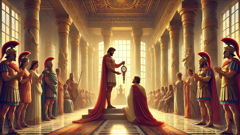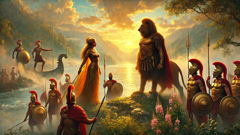Introduction
In the golden age of heroes, when the world was still young and gods roamed the land in disguise, tales of valor and cunning echoed across marble halls and windswept mountains. Among these stories, few held as much wonder as the labors of Heracles, the mightiest of mortals, who sought redemption for his tragic past through feats that pushed the limits of human endurance and spirit. Eight great tasks had already tested his sinews and wit, but the ninth—bestowed upon him by the calculating King Eurystheus—would demand something different. This was not a trial of brute force alone, but a journey into the unknown realms of culture, power, and diplomacy: Heracles was to bring back the girdle of Hippolyta, the formidable queen of the Amazons, a people both mysterious and feared throughout Greece.
The girdle, more than a simple ornament, was a symbol of divine favor and authority, gifted by Ares, god of war, to his fierce daughter Hippolyta. It was said to grant the wearer unmatched command over her warriors and inspire awe in all who gazed upon it. Admete, daughter of Eurystheus, coveted the relic not merely for its beauty, but for its legacy—a trophy to be paraded before the courts of Mycenae. Thus, Heracles was dispatched across the Aegean, far from familiar shores, into the heartland of Amazonian might. With a small company of loyal companions and the uncertain blessings of Olympus, he set sail towards Themiscyra, a city shrouded in legend where the river Thermodon met the wild lands beyond the known world.
From the outset, the journey bristled with challenges—tempestuous seas, strange isles, and the ever-watchful gaze of the gods. Heracles, famed for his strength, would discover that to succeed in this labor, he must wield not only his club and bow, but also patience, humility, and a willingness to understand those who lived by different codes. His quest for the girdle would spark encounters with warriors as proud as any in Greece, test the bounds of trust and betrayal, and reveal the tangled interplay of fate and choice. In the shadow of the Amazon’s ramparts, Heracles would learn that courage was not the absence of fear, but the resolve to meet the unknown with an open heart. Thus begins the tale of the ninth labor—a journey where myth and humanity entwine on the banks of the Thermodon.
A Journey Across Boundaries
Heracles’ departure from Tiryns was marked by both anticipation and foreboding. The wind was crisp, the sky flawless, but beneath the veneer of calm lurked a sense of dread. His company was chosen with care: Theseus of Athens, famed for his keen mind and unwavering loyalty; Iolaus, Heracles’ faithful nephew; Telamon of Salamis, a brawny warrior with a penchant for laughter even in the face of death; and a handful of others whose names would be woven into the tale’s tapestry. The ship that bore them, sturdy and swift, cut through Aegean waters, its prow adorned with painted eyes to ward off evil.

Days at sea blurred into one another. The men traded stories beneath the stars—tales of monsters vanquished, cities defended, loves lost and found. Yet even Theseus could not dispel the tension that hummed beneath the banter. The land of the Amazons was more than a distant rumor; it was a living enigma. Stories told of a people who worshipped Artemis with secret rites, who shunned men from their cities save for the purposes of war or treaty, who fought with unyielding resolve and bore wounds as marks of honor. Heracles listened, his gaze fixed on the horizon, pondering not just the challenge of battle but the weight of misunderstanding between cultures.
Trouble found them before they even glimpsed Themiscyra. On the island of Paros, pirates mistook their ship for an easy prize, but Heracles’ bow spoke with deadly precision. Later, tempests—perhaps sent by Poseidon, ever capricious—lashed their vessel, and only through teamwork did they reach calmer waters. At Samothrace, they paused to offer sacrifice at a windswept altar, hoping to secure favor from the gods who governed fate’s tangled threads.
At last, dawn broke upon the banks of the Thermodon. The land was wild and untamed: forests thick with ancient oaks and whispering poplars, hills alive with the scent of thyme and laurel. Heracles and his companions made landfall under wary eyes. Amazon scouts, lithe and silent, watched from the shadows, bows drawn. The heroes raised their hands in peace, signaling their intentions through gestures known to travelers—palms open, weapons sheathed. It was Theseus who called out first, his voice clear and respectful. Soon, an envoy of Amazons emerged, cloaked in wolf pelts and gleaming bronze, their leader’s gaze steady as she invited them to the city.
Themiscyra itself was unlike any city the Greeks had seen. Its walls were high, adorned with vivid frescoes of hunting and battle; its streets thronged with women of all ages, each carrying herself with pride. Banners fluttered from towers, bearing emblems of Artemis and Ares entwined. At the city’s heart stood a palace of white stone, its entrance flanked by statues of past queens. The air crackled with a blend of suspicion and curiosity. Heracles and his men were led through crowds that parted for them—some eyes wide with awe, others narrowed in calculation.
Within the palace’s grand hall, Hippolyta awaited. Tall and commanding, she wore her girdle over a tunic woven with the colors of sunrise. Her dark hair was braided with gold, her eyes sharp yet not unkind. As she rose to greet her guests, Heracles sensed both strength and sadness in her bearing—a ruler long accustomed to the burdens of command. The exchange that followed was tense but respectful. Heracles, mindful of the task’s delicate nature, explained his mission: he sought her girdle not for himself, but as a gift demanded by another’s pride. Hippolyta listened, her fingers tracing the ancient patterns embroidered on her belt. She spoke of the girdle’s history—how it had been earned through trials, blessed by the gods, and worn as a symbol of unity among her people.
For a moment, it seemed that diplomacy might triumph over violence. Hippolyta, impressed by Heracles’ candor, considered granting him the girdle as a gesture of goodwill. But the Fates rarely let heroes walk an easy path. Even as the air in the hall grew warm with possibility, distant eyes watched with envy and fear. Hera, queen of Olympus and sworn enemy of Heracles, was not content to see him succeed through peace. In the shadows beyond mortal sight, she began to weave chaos into the tapestry of the day.
The Shadow of Hera and the Battle for the Girdle
It was during the welcoming feast—where music mingled with laughter and platters overflowed with roasted game and honeyed fruits—that Hera’s influence began to stir. Disguised as an Amazon elder, she moved among the women, her words as subtle as the whisper of wind through reeds. "The Greeks have come to steal what is ours," she murmured to Melanippe, Hippolyta’s trusted sister. "Will you let your queen surrender the symbol of our strength without a fight?" The seeds of doubt took root, spreading like wildfire from ear to ear until suspicion thickened the air.

Hippolyta, sensing unrest among her council, called a private council. Melanippe argued fiercely against giving up the girdle, her loyalty burning bright but blinding. Antiope, another general, cautioned patience, but the mood had shifted. Even Hippolyta’s closest allies began to question Heracles’ motives. When word reached the city’s garrisons that foreigners might seize their queen’s sacred relic, warriors armed themselves and gathered at the palace gates. The promise of peace trembled on a knife’s edge.
Heracles, aware that something had changed but unsure of its cause, requested an audience with Hippolyta at dawn. They met in her private garden, beneath an ancient oak where doves cooed and bees drifted among wildflowers. Here, away from prying eyes, Hippolyta spoke candidly: "I believe you mean no harm, son of Zeus. Yet my people fear betrayal. If I yield the girdle, it may shatter the unity I’ve fought so hard to build."
Before Heracles could answer, a trumpet sounded—a harsh, urgent call that echoed through the palace. The gates burst open as Amazon warriors stormed in, eyes blazing with anger. At their head rode Melanippe, her sword drawn. She accused Heracles of treachery, claiming that the Greeks had plotted to abduct Hippolyta and enslave their people. Chaos erupted. Theseus and Iolaus rushed to defend their leader as palace guards clashed with Greek shields. Swords rang against bronze; arrows flew like swallows in a storm.
Amid the turmoil, Hippolyta tried to restore order, her voice rising above the din: "Enough! This is not our way!" But her words were lost in the frenzy. Hera’s shadow loomed over the battlefield, unseen but ever-present, twisting fear into violence. Heracles fought not to conquer, but to protect his friends and shield Hippolyta from harm. In a moment of clarity amid the tumult, he realized the only way to end the bloodshed was to take decisive action.
He confronted Hippolyta directly as the battle raged around them. "Give me the girdle, and I swear upon my name to leave your city in peace," he pleaded. Torn between duty and survival, Hippolyta hesitated—then unfastened the girdle from her waist and handed it to him. The leather shimmered with ancient runes; its weight was heavy with history. Heracles slipped it into his pack just as Melanippe, blinded by fury, lunged at him. He deflected her strike, refusing to return violence with death. Instead, he called out to the warriors: "Enough blood! The deed is done. I take only what I came for—by your queen’s hand!"
Slowly, the Amazons lowered their weapons. Hippolyta stepped between Heracles and her people, holding up her empty hands. "This quarrel ends now. Let us not add more sorrow to our legacy." Wounded but alive, Heracles and his companions retreated to their ship as the sun broke through the storm clouds. The city behind them smoldered with anger and regret, but also—perhaps—a spark of understanding. Hera, denied the disaster she’d hoped for, retreated to Olympus in bitter silence. And so, with the girdle secured and peace precariously restored, Heracles set his course for home, the lessons of Themiscyra etched forever in his heart.
The Return and the Cost of Victory
The voyage back across the Aegean was somber. Heracles, girdle in hand, sat apart from his companions, replaying the events in Themiscyra over and over. The weight of the relic was nothing compared to the burden on his conscience. Though he had fulfilled Eurystheus’ command, he could not ignore the cost—friendships strained, blood spilled, and a proud people left to mend what fear and misunderstanding had torn asunder.

Theseus tried to lift his friend’s spirits as their ship caught favorable winds, telling stories of Amazon valor and cleverness. "They are not so different from us," he mused. "Proud of their heritage, fierce in defense of their kin. We have won a prize, Heracles, but not without leaving something of ourselves behind." Iolaus tended to the wounded, binding both Greek and Amazon injuries alike—a gesture that would be remembered by those spared in the chaos.
As their vessel approached the familiar coastline of Mycenae, word spread swiftly that Heracles had returned triumphant. Eurystheus, ever eager to parade another trophy, summoned his court and demanded that Heracles present the girdle before all. Admete, whose desire had set this labor in motion, marveled at the relic’s craftsmanship but could not grasp the pain hidden in its seams. To her and her father, the girdle was simply proof of Greek supremacy—a symbol to be displayed during festivals and feasts.
But for Heracles, the journey was not so easily celebrated. In private, he recounted to Admete the truth of what had transpired—the courage and dignity of Hippolyta, the manipulation that turned trust into conflict, and the choice to accept the girdle not as plunder, but as a costly token of fragile peace. Admete, struck by his candor, resolved to use the girdle not merely as a boastful adornment but as a reminder that strength should be tempered with empathy.
Word of the encounter spread throughout Greece. Some praised Heracles for his restraint and wisdom; others whispered that he had gone soft, that a true hero would have taken what he wanted by force. Yet among those who had seen battle—who understood the true price of victory—a new respect grew for the hero who had chosen a path of compromise rather than carnage. In temples and marketplaces, bards began to sing a different kind of song: one that celebrated not just strength, but the courage to walk away from unnecessary violence.
The Amazons, too, faced a period of reckoning. Hippolyta’s grip on her people was tested, but she emerged with her authority intact—her willingness to sacrifice for the greater good seen as a sign of true leadership. Melanippe, chastened by the consequences of her fury, became a champion for dialogue rather than suspicion. Themiscyra would rebuild, its women scarred but unbroken.
As seasons turned and old wounds began to heal, Heracles found himself changed by the ordeal. The ninth labor had taught him that heroism was not measured solely by trophies won or monsters slain. True courage—he realized—lay in understanding the hearts of others and in accepting that every victory comes with a cost. The story of Heracles and Hippolyta would be told for generations: a myth not just of conquest, but of the uneasy peace that can grow when strangers choose compassion over fear.
Conclusion
Thus ended the ninth labor of Heracles, not with a resounding victory march or an unblemished hero’s return, but with the quiet dignity of lessons hard-won. In a world where legends often glorified conquest and brute strength, this tale whispered of another kind of greatness—the ability to see one’s adversaries as equals, to listen even when surrounded by suspicion, and to choose peace when violence beckoned. The girdle of Hippolyta became more than a mere trophy in Mycenae; it stood as a silent witness to the complexities of heroism and leadership. Heracles’ journey through Themiscyra echoed across generations, reminding those who heard his story that courage is not only found on the battlefield, but also in moments of restraint, understanding, and empathy.
The Amazons rebuilt what had been broken, their queen remembered as much for her wisdom as for her martial prowess. Greek poets and storytellers would revisit this tale again and again, finding new meaning in its layers with each telling. And as Heracles moved on to face new challenges—dragons, giants, and other impossible quests—he carried with him not only the scars of conflict, but the quiet strength that comes from facing one’s own doubts and learning from those he once called foes. In the myth of Hippolyta’s girdle, myth and humanity entwined, leaving behind a legacy as enduring as the stones of Themiscyra and the endless tides of the Aegean.













